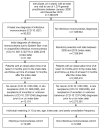The Association between Infectious Mononucleosis and Cancer: A Cohort Study of 24,190 Outpatients in Germany
- PMID: 36497319
- PMCID: PMC9736164
- DOI: 10.3390/cancers14235837
The Association between Infectious Mononucleosis and Cancer: A Cohort Study of 24,190 Outpatients in Germany
Abstract
Background: Cancer represents one of the leading causes of death worldwide. Besides genetic risk factors and non-communicable diseases, chronic infections including Epstein−Barr virus (EBV) infection have been identified as promotors of cancer. In the present manuscript, we evaluated the association between infectious mononucleosis, the clinical manifestation of EBV infection, and cancer development in a real-word cohort of outpatients in Germany. Methods: We used the Disease Analyzer database (IQVIA) and matched a total of 12,095 patients with infectious mononucleosis to a cohort of individuals without infectious mononucleosis based on age, sex, index year, and annual patient consultation frequency between 2000 and 2018. Results: Patients diagnosed with infectious mononucleosis had a cancer incidence of 5.3 cases per 1000 person years versus 4.4 cases per 1000 person years for patients without infectious mononucleosis. In multivariable regression models, infectious mononucleosis showed a trend towards a higher incidence of cancer in general in the age group > 50 years (incidence rate ratio (IRR): 1.32; 95% CI: 1.04−1.67) and among men (IRR: 1.36; 95% CI: 1.07−1.72). Infectious mononucleosis was significantly associated with an increased incidence of tumors of the hematopoietic and lymphoid tissues (IRR: 1.75; 95% CI: 1.22−2.50) and showed a strong trend towards an association with prostate cancer (IRR: 3.09; 95% CI: 1.23−7.76). Conclusion: Infectious mononucleosis is associated with an increased incidence of certain cancer types. The present data from a large real-world cohort support the evidence on a role of EBV in the development of different malignancies and could trigger research efforts to further elucidate its precise involvement in the carcinogenic process.
Keywords: EBV; Epstein–Barr-Virus; cancer; hematopoietic tissue; infectious mononucleosis; lymphoma.
Conflict of interest statement
The authors declare no conflict of interest.
Figures


Similar articles
-
Infectious mononucleosis is associated with an increased incidence of multiple sclerosis: Results from a cohort study of 32,116 outpatients in Germany.Front Immunol. 2022 Aug 2;13:937583. doi: 10.3389/fimmu.2022.937583. eCollection 2022. Front Immunol. 2022. PMID: 35983044 Free PMC article.
-
Infectious mononucleosis is associated with an increased incidence of Crohn's disease: results from a cohort study of 31 862 outpatients in Germany.Eur J Gastroenterol Hepatol. 2023 Mar 1;35(3):255-260. doi: 10.1097/MEG.0000000000002505. Epub 2023 Jan 17. Eur J Gastroenterol Hepatol. 2023. PMID: 36708295
-
On the aetiology of Hodgkin lymphoma.Dan Med J. 2012 Jul;59(7):B4485. Dan Med J. 2012. PMID: 22759852 Review.
-
Infectious mononucleosis is associated with an increased incidence of NAFLD.Eur J Clin Invest. 2023 Mar;53(3):e13911. doi: 10.1111/eci.13911. Epub 2022 Nov 30. Eur J Clin Invest. 2023. PMID: 36409277
-
Risk factors for Hodgkin's lymphoma by EBV status and significance of detection of EBV genomes in serum of patients with EBV-associated Hodgkin's lymphoma.Leuk Lymphoma. 2003;44 Suppl 3:S27-32. doi: 10.1080/10428190310001623801. Leuk Lymphoma. 2003. PMID: 15202522 Review.
Cited by
-
The Fight against the Carcinogenic Epstein-Barr Virus: Gut Microbiota, Natural Medicines, and Beyond.Int J Mol Sci. 2023 Jan 15;24(2):1716. doi: 10.3390/ijms24021716. Int J Mol Sci. 2023. PMID: 36675232 Free PMC article. Review.
-
Risk of inflammatory bowel disease following hospitalisation with infectious mononucleosis: nationwide cohort study from Denmark.Nat Commun. 2024 Sep 27;15(1):8383. doi: 10.1038/s41467-024-52195-8. Nat Commun. 2024. PMID: 39333475 Free PMC article.
-
Association between iron deficiency anemia and subsequent stomach and colorectal cancer diagnosis in Germany.J Cancer Res Clin Oncol. 2024 Jan 30;150(2):53. doi: 10.1007/s00432-023-05534-z. J Cancer Res Clin Oncol. 2024. PMID: 38289465 Free PMC article.
-
Herpes zoster is not associated with subsequent gastrointestinal cancer: data from over 200,000 outpatients in Germany.J Cancer Res Clin Oncol. 2023 Dec;149(19):17115-17121. doi: 10.1007/s00432-023-05432-4. Epub 2023 Sep 27. J Cancer Res Clin Oncol. 2023. PMID: 37759134 Free PMC article.
-
Genetic susceptibility association between viral infection and colorectal cancer risk: a two-sample Mendelian randomization analysis.Infect Agent Cancer. 2024 Aug 10;19(1):37. doi: 10.1186/s13027-024-00602-6. Infect Agent Cancer. 2024. PMID: 39123209 Free PMC article.
References
-
- Ferlay J.L.M., Ervik M., Lam F., Colombet M., Mery L., Piñeros M., Znaor A., Soerjomataram I., Bray F. Global Cancer Observatory: Cancer Tomorrow. International Agency for Research on Cancer; Lyon, France: 2020. [(accessed on 20 September 2022)]. Available online: https://gco.iarc.fr/tomorrow.
-
- IARC Working Group on the Evaluation of Carcinogenic Risks to Humans Epstein-Barr Virus and Kaposi’s Sarcoma Herpesvirus/Human Herpesvirus 8. Lyon (FR): International Agency for Research on Cancer; 1997. (IARC Monographs on the Evaluation of Carcinogenic Risks to Humans, No. 70) [(accessed on 15 November 2022)]; Available online: https://www.ncbi.nlm.nih.gov/books/NBK385507/
LinkOut - more resources
Full Text Sources

